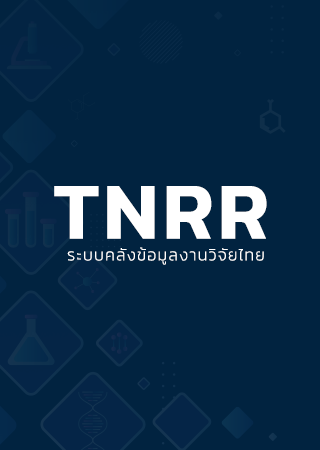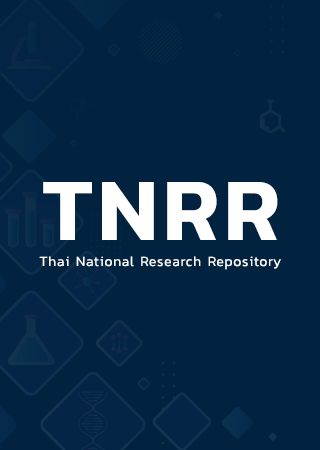Description
แผนงานวิจัยท้าทายไทย: ทะเลไทยไร้ขยะ ระยะที่ 2 ใช้แนวคิดการจัดการขยะบนพื้นฐานการจัดการเชิงนโยบายและเทคโนโลยี การใช้ทรัพยากรอย่างมีประสิทธิภาพสูงสุดเพื่อนำไปสู่ zero waste ในทุกระดับตั้งแต่ภาคการผลิตจนถึงระดับการบริโภคในพื้นที่ ผลการดำเนินการทำกิจกรรมส่งเสริมและสนับสนุนการวิจัยดำเนินการจัดประชุมและจัดทำรายงานเสนอแก่สำนักงานการวิจัยแห่งชาติทั้งหมดเป็นไปตามเงื่อนไขในสัญญา ส่วนผลการดำเนินงานวิจัยได้ผลดังนี้ กรอบวิจัยที่ 1 การจัดการขยะ โดยเฉพาะขยะพลาสติกจากทะเล ได้ดำเนินการศึกษาการใช้เทคโนโลยีอากาศยานไร้คนขับ และระบบตรวจรู้ ตรวจหาและเฝ้าระวังขยะใต้ผิวน้ำทะเล ในการสำรวจขยะที่สามารถตรวจสอบขยะที่ระดับความลึกไม่เกิน 6 เมตร ทำงานต่อเนื่องได้ 2 ชั่วโมง การพัฒนาเรือบังคับทางไกลสำหรับเก็บขยะในบริเวณชายฝั่งที่เป็นจุดอับ ที่สามารถรวบรวมขยะได้สูงสุด 84 กิโลกรัมต่อชั่วโมง โดยมีต้นทุนการเก็บขยะในทะเล 1.45 บาทต่อกิโลกรัมขยะ และรถกวาดขยะชายหาดที่มีอัตราการจัดเก็บขยะได้ 37 กิโลกรัมต่อชั่วโมง มีต้นทุนการเก็บขยะชายหาดเท่ากับ 22.4 บาทต่อกิโลกรัมขยะ พัฒนาถังขยะอัจฉริยะที่คัดแยกขยะได้เองและเชื่อมต่อกับระบบอินเตอร์เน็ทเพื่อช่วยในการคัดแยกขยะและแจ้งสถานะของปริมาณขยะในถังรวม ขยะที่ได้โดยเฉพาะขยะพลาสติกจากทะเลถูกชุมชนในพื้นที่ศึกษานำไปใช้เป็นวัตถุดิบในการผลิตผลิตภัณฑ์ที่มีมูลค่า หรือผลิตภัณฑ์ Upcycling และนำไปใช้ประโยชน์ได้ จากการดำเนินการในโครงการ ทำให้เกิดการหมุนเวียนเงินในพื้นที่ 425,050 บาท และได้กำไรเป็นมูลค่ารวม 132,210บาท กรอบวิจัยที่ 2 การกำหนดมาตรฐานวิธีการวิเคราะห์ไมโครพลาสติกในสิ่งแวดล้อม วิธีการวิเคราะห์ควรเป็นไปตามข้อกำหนดของ National Oceanic and Atmospheric Administration (NOAA) ประเทศสหรัฐอเมริกา พัฒนาวิธีการเก็บตัวอย่างสามารถเก็บตัวอย่างโดยใช้เครื่องสูบน้ำเพื่อเก็บตัวอย่างน้ำที่มีปริมาตรอย่างน้อย 5 ลบ.ม สำหรับการศึกษาไมโครพลาสติกในอาหารทะเลแปรรูป พบการปนเปื้อนไมโครพลาสติกรูปร่างเส้นใยมากที่สุดในผลิตภัณฑ์น้ำปลาแท้ ปลากระป๋อง หมึกเส้นปรุงรส น้ำปลาร้าปรุงสุก และเกี๊ยวกุ้งดิบ ส่วนผลิตภัณฑ์หอยแมลงภู่ดองพบไมโครพลาสติกแบบกำหนดรูปร่างไม่ได้มากที่สุด กรอบวิจัยที่ 3 จัดทำระบบรับรองมาตรฐานการผลิตในอุตสาหกรรมพลาสติกและผลิตภัณฑ์ สำหรับมาตรฐานการผลิตในอุตสาหกรรม ได้นำไปทดสอบใช้กับโรงงานอุตสาหกรรมพลาสติกต้นน้ำนำร่องจำนวน 10 แห่ง และขั้นตอนการกำหนดเกณฑ์การตรวจประเมิน ได้แก่ การจัดเตรียมข้อมูล การจัดเตรียมร่างเกณฑ์ข้อกำหนดฯ การรับรองร่างเกณฑ์ข้อกำหนดฯ และสำหรับมาตรฐานผลิตภัณฑ์รีไซเคิลในด้านสิ่งแวดล้อม ปัจจุบันการประกาศใช้เกณฑ์ข้อกำหนดฯ เกณฑ์ข้อกำหนดสินค้าและบริการที่เป็นมิตรกับสิ่งแวดล้อมของผลิตภัณฑ์ประเภทวัสดุก่อผนัง ได้รับการขึ้นทะเบียนฯ ของกรมควบคุมมลพิษเป็นที่เรียบร้อยแล้ว กรอบวิจัยที่ 4 จัดทำแผนการบริหารจัดการขยะเชิงพื้นที่ เพื่อนำไปสู่การจัดการขยะพลาสติกให้เป็นศูนย์ ภายในปี พ.ศ. 2575 และแผนการจัดการไมโครพลาสติกในสิ่งแวดล้อม ข้อเสนอแนะในภาพรวมคือการจัดการปัญหาขยะในพื้นที่ต้องมีการดำเนินการอย่างต่อเนื่องโดยได้รับการสนับสนุนในเชิงนโยบายจากภาครัฐ การนำเทคโนโลยีที่พัฒนาขึ้นมาใช้ประโยชน์ และการปรับปรุงกระบวนการจัดซื้อจัดจ้างภาครัฐเพื่อสนับสนุนการใช้งานและการพัฒนาผลิตภัณฑ์ upcycling และนโยบายที่เสนอควรได้รับการขับเคลื่อนไปพร้อมๆ กันอย่างต่อเนื่อง โดยทุกภาคส่วนในสังคมเพื่อสนับสนุนการสร้างระบบเศรษฐกิจหมุนเวียน บรรลุเป้าหมายการจัดการแบบ zero waste และสอดคล้องกับแผนพัฒนาเศรษฐกิจและสังคม ฉบับที่ 13 หมุดหมายที่ 10 ไทยมีเศรษฐกิจหมุนเวียนและสังคมคาร์บอนต่ำ<br><br>The Grand Challenge Thailand Research Program: Thai Sea Free of Garbage Phase 2 implemented the policy and technological based for waste management to optimize resource utilizations that lead to zero waste at all levels from production to local consumption. All activities that promote and support the research, including conduct meetings and prepare reports to the National Research Council of Thailand are in accordance with the terms of the contract. The results are as follows: Research Framework 1: the results show that innovative underwater waste detection and surveillance system can identify waste 6 m in depth maximum and can use continually 2 houres. The garbage collecting boat and the beach sweeper truck can collect maximum 84 and 37 kg waste per hour, respectively and the capital and operation costs of the garbage collecting boat and the beach sweeper truck are 1.45 and 22.4 Thai baht per kg waste, respectively. Additionally, the comprising smart waste separation bins that connect internet, are created due to separate waste and detect the waste level in these bins. The plastic waste that is collected from beach and sea, are raw materials for upcycling products in the study area of Bang Saen Beach, Koh Sichang, Ban Amphoe Beach, and Ban Khun Samut Chin Community. The annual total cash flows and benefits from all study areas are 425050 and 132210 Thai baht. Research Framework 2: The methods for the analysis of microplastics in the environment were standardized and comply with the requirements of the National Oceanic and Atmospheric Administration, U.S. Department of Commerce (NOAA). The sampling method was developed such that it could be conducted by using suction pump to collect at least 5 m3 of water sample. For the study of microplastics in processed seafood, fibrous microplastics contamination was the most frequently found in pure fish sauce, canned fish, seasoned squid, cooked fermented fish sauce, and raw shrimp dumplings. As for pickled mussel products, the most microplastics found were indeterminable in shape. Research Framework 3: The established certification system for industrial productions of plastics products has been implemented in 10 pilot plants. In addition, the environmentally friendly product certification of the wall building material has been accepted and published by PCD. Research Framework 4: The zero-waste management plant (present – 2032) and the microplastic management plant are created. The overall recommendations are the continually management of local leftover waste with supporting policies from the government, applications of the developed technologies, and the amendment of the government procurement process, to support the uses and developments of upcycling products. The suggested policies should be implemented continuously together at the same time by all sectors in the society to create the circular economy with zero waste target and to support the draft thirteenth National Economic and Social Development Plan especially the tenth target (circular economy and low carbon society).
Date of Publication :
02/2023
Publisher :
สำนักงานการวิจัยแห่งชาติ (วช.)
Category :
รายงานการวิจัย
Total page :
77012 pages
People Who Read This Also Read


